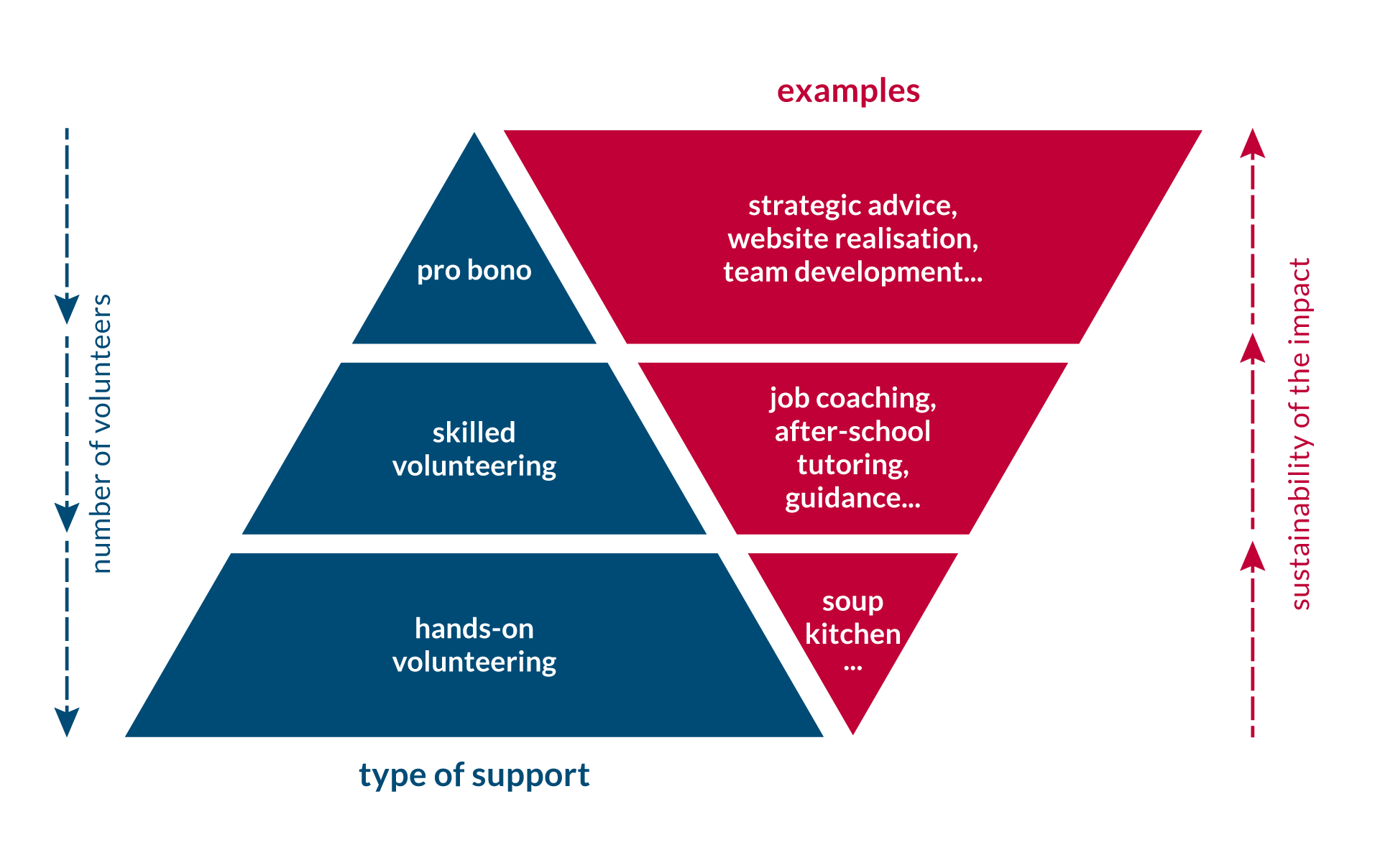
Are you in the process of setting up a new project or do you want to start an organizations from scratch? Then you are facing a whole new set of challenges and could probably use a lot of helping hands. In some places you lack the necessary expertise – or people you can ask.
How would you like to work together as a team and what type of decision-making is right for you? Do you prefer flat hierarchies?
And what happens when conflicts arise?
Are you developing your new website and need an expressive design? Are you unsure about the copyrights for your publications and do you also need to create terms and conditions?
There are experts for your tasks who are happy to offer their knowledge and time free of charge – i.e. pro bono – if they think your project is worth supporting. Now it’s all about presenting your mission well and inspiring others to join in.
New organizations in particular spend a lot of energy on the design and development of their offers and projects. A solid infrastructure is not necessarily a priority. Pro bono support can help to make certain processes more sustainable. This in turn allows project managers to focus fully on fulfilling their mission.
But pro bono expertise can also provide valuable support in later stages of an organization’s development when specific challenges arise. Use pro bono cooperation for your organizational development – just give it a try!

When you use pro bono services as organizations, you gain tremendously. You can access a wide range of skills and knowledge that might not otherwise be available to you. You gain access to much-needed expertise, making it easier to find sustainable and effective solutions to existing problems.
The jointly implemented measures often form the basis for future projects and have a lasting impact on the organization. Another important aspect is training. After all, working with pro bono volunteers brings new skills to the team that can be called upon when needed and are very valuable. The solutions that are developed together are effective and professional. It is not uncommon for an organization to gain long-term reinforcement when a pro bono volunteer who is enthusiastic about the mission takes on additional tasks, for example in committees or volunteer functions.

The visualization of the data has revolutionized our work. We have often used the maps in discussions with politicians, stakeholders and donors. Our counterparts have understood much faster and better what we achieve. We were able to convince existing supporters of our effectiveness and gain new supporters. The project really was a game changer for us.
Silbernetz e.V.

The term pro bono is derived from the Latin pro bono publico which means “for the good of the public”. It describes the use of expertise and services that are offered free of charge for a good cause. Companies and individuals play their part in strengthening civic engagement. As committed professionals, they volunteer their skills and knowledge and help Organizations with their (further) development and the establishment of sustainable structures.
On the one hand, this leads to an expansion of resources for nonprofits. On the other hand, freelancers and companies strengthen their social awareness and increase trust in their community.
* no “low bono” or discount offers; however, agency fees may apply
Support is possible in various formats. This depends on the respective programme and the way the Intermediary works, but also, for example, on the structural conditions in companies that release their employees for pro bono assignments.
The most common form is probably the engagement of individuals or a team for a specific pro bono project. In a corporate context, these assignments are approved and regularly paid. Private volunteers also carry them out in their free time. The time commitment depends on the scope of the specific project and is limited. The formats that fit into this form of engagement are consulting (including mentoring), the Development of a product or the concrete Implementation of a service, but also Assessments.
Special formats are workshops – in which several Organizations receive support for solving their challenge in parallel or a Marathon (also “Hackathon” for software/IT), in which the time spent is predetermined – for example a day or 24 hours or a “night shift”. Several volunteers often work together or in parallel on one topic.
In addition, very short periods of support should also be mentioned here, such as in a help desk or the (telephone) help desk. Secondments, in which a company makes its services available on a longer-term basis and “loans” employees to the Organizations, are still offered less frequently.
At its best, pro bono cooperation is a win-win situation – for both the supporters and the recipients. It is time to further expand this form of engagement and promote the pro bono idea in Germany. When organizations think about support from companies, it is often about fundraising and donations or sponsoring services are requested. It is not uncommon for donations to be used to bring specialist staff into the team. Pro bono is one way of obtaining support directly.
Pro bono has a much longer tradition in the USA than in Germany. During the 1960s, pro bono work by lawyers was essential in the context of the civil rights movement. This arose from the need to provide legal support to activists and disadvantaged communities who were fighting discrimination and racial segregation.
For employees in companies, freelancers and other experts, the idea of social responsibility is becoming increasingly important. Corporate collaborations are becoming increasingly important for Organizations in Germany. This applies in particular to the use of company employees’ time and expertise as part of corporate volunteering programs.
However, the programs presented on this website show that many freelancers also want to make their expertise available for a good cause – without being part of a company. In addition to company employees, the networks of the Pro Bono Allianz Deutschland also include self-employed people, students and qualified private individuals.
The different forms of corporate volunteering can be roughly divided into two areas: On the one hand, there are practical support offers that any company can implement because they are not tied to specific skills (English “non-skilled” or “hands-on” volunteering). This includes, for example, serving food in a soup kitchen or packing relief supplies. The second area involves the use of certain skills (skills-based volunteering). This includes the pro bono area, which we would like to introduce to you on these pages
, but also mentoring formats or skills transfer (tutoring).
Experience shows that all forms of corporate volunteering can have a major impact. The special feature of pro bono partnerships is that a very long-term/sustainable impact can be achieved on the part of the organizations with the use of relatively few pro bono volunteers.

According to a graphic by the Taproot Foundation
Whether for employees from companies or freelancers, pro bono work offers an excellent opportunity to use your own skills and resources outside of the traditional profit orientation.
A significant advantage of this type of engagement is that it allows you to expand, develop and pass on your own expertise. Professionals can acquire new skills by working in different fields and facing different challenges. Even experienced professionals gain valuable insights and lessons in new contexts. They change perspective, possibly going out of town, away from their own desk and maybe even out of their own social class – to people with different social/financial backgrounds.
Companies that engage in pro bono work not only promote the well-being of the community, but also benefit themselves by expanding their knowledge and skills and, last but not least, from a positive image.

I am delighted to be able to use my experience and skills for nonprofit organizations in a meaningful way. The founders and employees of these organizations inspire me time and again with their wealth of ideas and high level of commitment to social change.
Dagmar Attolini, GROWTH Consulting & Coaching

Even if you receive support, you will have to pitch in yourself. Please do not underestimate the time resources that you will have to devote to coordinating the collaboration. For those responsible at the Organizations, this means preparing the pro bono assignment, supervising it and finally implementing the results. It also often requires decisions from committees or input from colleagues.
Intermediaries can help you with this.
Intermediaries can help you with this.
Probably the most difficult step on the way to a good pro bono cooperation: find the right people who would like to support you on a pro bono basis. Make sure that they have the right expertise and time resources.
Intermediaries can help you with this.
In the initial meeting (and also in the further course), agreements on expectations and goals as well as a concrete schedule form the basis of the work. A permanent contact person with the necessary capacity is needed to clarify questions, report to the team and receive feedback. Ensures commitment in the collaboration and open communication to avoid misunderstandings
Allow sufficient time to receive all the advice and comments from the advisory team. This may be a unique opportunity to benefit from their expertise. Pay attention to mutual appreciation and celebrate milestones.
Now it is time for the contact person to implement the results of the consultation and in turn take the team with them.
Evaluate the results by considering both the successes and examining the obstacles. Both will help to guide future pro bono partnerships even more precisely. If possible, ask everyone involved about their experiences during the collaboration. An important aspect is to document this evaluation so that you can easily access what you have learned next time.
Intermediaries also carry out an evaluation.